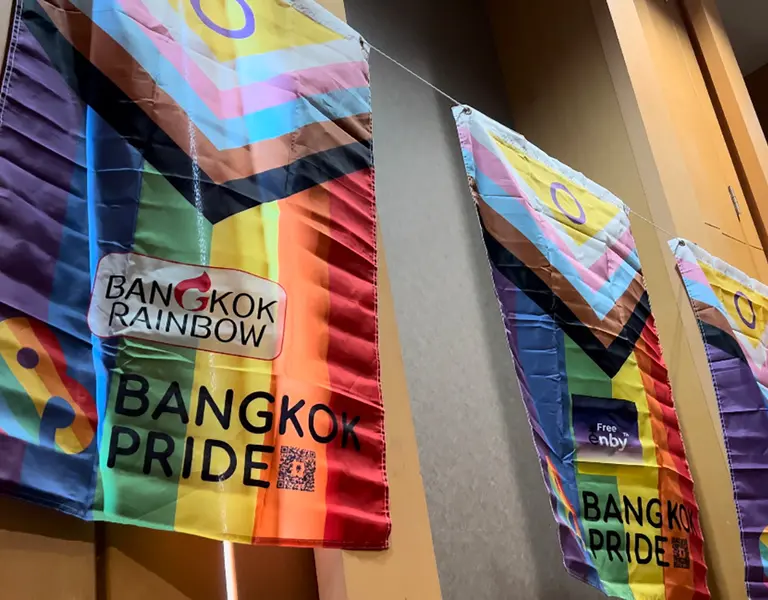Thailand's Transgender Community: A Fight For Equality In The Spotlight

Table of Contents
Legal Rights and Recognition for Thailand's Transgender Individuals
Legal Gender Recognition
The process of legal gender recognition for transgender individuals in Thailand remains a complex and often challenging undertaking. While some progress has been made, significant hurdles persist. Changing one's legal gender requires navigating a bureaucratic maze, involving medical evaluations, hormonal therapy documentation, and substantial costs. Recent legal reforms have streamlined some aspects, but further advancements are crucial.
- Current laws regarding name and gender marker changes on official documents: The process requires court approval and can be lengthy and expensive.
- Access to hormone replacement therapy (HRT) and gender-affirming surgeries: While HRT is increasingly accessible, the cost can be prohibitive for many. Gender-affirming surgeries remain expensive and require significant travel for many individuals.
- Legal protections against discrimination based on gender identity: While some anti-discrimination laws exist, enforcement remains inconsistent and challenges in proving discrimination are frequent.
- Challenges faced in accessing legal gender recognition: These include high costs, bureaucratic hurdles, and the requirement of extensive medical documentation, creating significant barriers for many transgender individuals.
Marriage Equality and Family Rights
Same-sex marriage remains illegal in Thailand, significantly impacting the rights and recognition of transgender individuals seeking to marry and form families. While there's growing social acceptance, legislative changes are needed to ensure equal rights for transgender couples and families.
- Current legal standing of same-sex marriage in Thailand: Currently, same-sex marriage is not legally recognized.
- Rights of transgender parents regarding child custody and adoption: Legal frameworks regarding the rights of transgender parents remain unclear and often disadvantageous.
- Access to reproductive healthcare for transgender individuals: Access to reproductive healthcare services tailored to the needs of transgender individuals is limited.
- Legal challenges and ongoing activism related to family rights: Advocacy groups are actively working to push for legislative reforms and increased legal protections for transgender families.
Social Acceptance and Stigma
Societal Perceptions and Attitudes
Thai society presents a wide spectrum of attitudes towards transgender individuals, ranging from open acceptance to deep-seated prejudice and discrimination. While some progress has been made in fostering greater understanding, pervasive societal stigma remains a significant challenge for many.
- The role of cultural traditions and beliefs in shaping societal perceptions: Traditional gender roles and religious beliefs continue to influence societal attitudes towards transgender individuals.
- Examples of positive and negative representations of transgender individuals in media: While media representation is improving, negative stereotypes and sensationalized portrayals still exist.
- Impact of social stigma on transgender individuals' mental health and well-being: The constant pressure of social stigma contributes significantly to mental health issues within the transgender community.
- The role of education and awareness campaigns in promoting acceptance: Education initiatives and public awareness campaigns are crucial to combatting prejudice and fostering greater acceptance.
Discrimination and Violence
Transgender individuals in Thailand face various forms of discrimination and violence, including workplace discrimination, housing discrimination, verbal abuse, and physical assault. These acts of violence often go unreported due to fear of further discrimination or lack of trust in law enforcement.
- Workplace discrimination and lack of employment opportunities: Many transgender individuals face significant barriers to finding employment due to prejudice and lack of inclusive workplace policies.
- Housing discrimination and lack of safe and inclusive housing options: Finding safe and inclusive housing can be a significant challenge for transgender individuals due to discrimination and fear of harassment.
- Violence and harassment, including hate crimes targeting transgender individuals: Sadly, transgender individuals are disproportionately targeted by violence and hate crimes.
- The role of law enforcement in addressing and preventing violence: Improved training and greater sensitivity within law enforcement are crucial for addressing and preventing violence against transgender individuals.
Cultural Influences and the Kathoey Tradition
Understanding the Kathoey Role
The term "kathoey" (กะเทย) refers to transgender women in Thai society. The kathoey tradition has a long and complex history, holding both positive and negative connotations. Historically, kathoey held specific roles in Thai society, often in entertainment and religious contexts. Today, the term's interpretation and understanding are evolving.
- Historical significance of the kathoey role in Thai culture: Kathoey have historically played important roles in religious ceremonies and entertainment, holding unique positions within society.
- Traditional and contemporary roles of kathoey in society (entertainment, religious practices, etc.): While some kathoey continue to work in the entertainment industry, many seek broader roles and professions.
- The evolving understanding and representation of kathoey in modern Thailand: The meaning and perception of "kathoey" are being redefined and debated, reflecting the changing social landscape.
Intersectionality and Diverse Experiences
It's crucial to recognize the diversity within Thailand's transgender community. Experiences differ significantly based on intersecting identities like class, ethnicity, region, and socioeconomic status.
- Experiences of transgender individuals from different socioeconomic backgrounds: The challenges faced by transgender individuals vary depending on their socioeconomic background, with those from lower socioeconomic backgrounds often facing greater obstacles.
- Experiences of transgender individuals from diverse ethnic groups: Experiences also vary across ethnic groups, with cultural nuances impacting societal perceptions and access to resources.
- The impact of intersecting identities on the lived realities of transgender individuals: Understanding these intersecting identities is crucial for creating effective and inclusive policies and support systems.
Progress and Ongoing Advocacy
Successes and Achievements
Despite the persistent challenges, there have been significant strides in the fight for transgender rights in Thailand. Increased media visibility, growing public awareness, and the emergence of strong advocacy groups are contributing to positive change.
- Examples of successful advocacy campaigns and their impact: Advocacy groups have played a vital role in raising awareness and pushing for legal reforms.
- Increased visibility and representation of transgender individuals in media: While more is needed, increased media representation is gradually helping to normalize transgender identities.
- Growth of support networks and LGBTQ+ organizations: Support networks provide crucial resources and a safe space for transgender individuals.
Challenges and Future Goals
Despite progress, significant challenges remain. Full legal equality, an end to discrimination, and access to appropriate healthcare and resources are all essential goals for the future.
- Ongoing legal battles and advocacy efforts: Continued legal advocacy is crucial to secure further legal protections for transgender rights.
- Need for increased public education and awareness: Education campaigns remain critical to fostering understanding and combating prejudice.
- Future goals for transgender rights in Thailand: The ultimate goal is the full and equal inclusion of transgender individuals in Thai society, encompassing legal recognition, social acceptance, and equal access to opportunities.
Conclusion
Thailand's transgender community faces a complex and multifaceted reality. While some progress has been made towards greater acceptance and legal recognition, significant challenges persist in achieving full equality. The ongoing fight for transgender rights in Thailand requires continued advocacy, education, and legislative action to address the deeply rooted societal biases and systemic discrimination that transgender individuals experience. Learn more about the ongoing fight for equality within Thailand's transgender community and consider supporting organizations dedicated to improving the lives of transgender individuals in Thailand, furthering transgender rights in Thailand, and advancing the cause of Thailand's transgender community advocacy.

Featured Posts
-
 Wheelchair Accessibility Issues And Solutions On The Elizabeth Line
May 10, 2025
Wheelchair Accessibility Issues And Solutions On The Elizabeth Line
May 10, 2025 -
 The Us Attorney General And Fox News A Daily Occurrence Worth Investigating
May 10, 2025
The Us Attorney General And Fox News A Daily Occurrence Worth Investigating
May 10, 2025 -
 Strands Nyt Friday March 14th Answers And Hints For Puzzle 376
May 10, 2025
Strands Nyt Friday March 14th Answers And Hints For Puzzle 376
May 10, 2025 -
 Is Us Taxpayer Money Funding Transgender Mouse Research
May 10, 2025
Is Us Taxpayer Money Funding Transgender Mouse Research
May 10, 2025 -
 Dijon Vehicule Lance Contre Un Mur Rue Michel Servet Le Conducteur Se Denonce
May 10, 2025
Dijon Vehicule Lance Contre Un Mur Rue Michel Servet Le Conducteur Se Denonce
May 10, 2025
